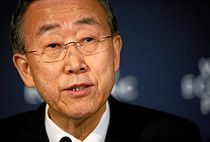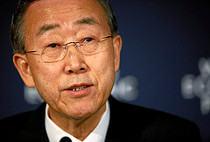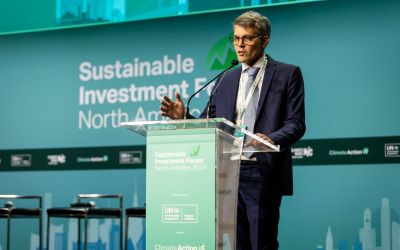Ban Ki-moon considers celebrity and art to combat climate change
The UN secretary general Ban Ki-moon, and other UN figures, will attend a discussion for the entertainment industry in Hollywood, with a view to pitching a film on climate change.

 The UN secretary general Ban Ki-moon, and other UN figures, will attend a discussion for the entertainment industry in Hollywood, with a view to pitching a film on climate change.
The UN secretary general Ban Ki-moon, and other UN figures, will attend a discussion for the entertainment industry in Hollywood, with a view to pitching a film on climate change.
Other high profile figures involved in the talks this Oscars week will include the IPCC's Rajendra Pachauri, the UNFCCC's Christina Figueres and actor Don Cheadle.
Ki-moon is in Hollywood trying to raise the profile of climate change. Although he has provided no specific film treatments so far, he has suggested the possibility of a film about global warming, to help draw attention to the problem.
"Usually I speak to prime ministers and presidents, but that has its limits," Ban told the Los Angeles Times.
The UN has long had an appreciation for the value of celebrity, using star power to draw attention to issues such as the refugee crises and violence against women.
Ki-moon attended Oscar week last year in an attempt to enlist the film industry's assistance in polishing the UN’s public image.
He lobbied hundreds of the world's most influential actors, directors, and film producers about the potential benefits of storylines that portray the UN in a positive light and focus on the heroic stories behind its humanitarian work in countries such as Haiti, and peacekeeping missions in other global trouble spots.
The agenda behind a climate change film appears to be focused on improving the image of the UN, and critics doubt that celebrity endorsement can help the climate change cause.
In a poll carried out by Care2, 41 per cent of people questioned said celebrity endorsements for noble causes are only effective if celebrities "walk the walk and don't just preach”, with 29 per cent saying they do not care what celebrities are backing.
There is an issue of indifference and also distrust towards celebrity backing of causes such as climate change, including the view that the amount of money used to pay for the celebrity could be put to better use.
Ki-moon believes that a top-end, celebrity-endorsed message can set a powerful example. Other individuals have also tried to increase the profile of climate change with film.
Al Gore's An Inconvenient Truth (2006) was a critical and box-office success, winning Academy Awards for Best Documentary Feature. A year later, Leonardo DiCaprio produced another film documentary about global warming, The 11th Hour.
Art has historically been used as a political tool by governments to influence society, as well as by people challenging social order and government. Film could have a significant impact on public perception of climate change, and the way issues are portrayed, and the celebrities used, are key.
Various art forms, including visual imagery, can facilitate going beyond the written facts and put a human face on challenges that are upon us, believes Doctor Robert Gass, a professor in human communication studies. Art satisfies the major requirements for persuasion- intentionality, effects, symbolic action and free choice/conscious awareness, believes Gass.
Artist Ed Kashi, whose work Curse of the Black Gold chronicling oil extraction in the Niger delta won him the Prix Pictet Commission 2009, said in an interview: “[art] is an incredibly important part of the sweeping scope of communications that must take place to bring out change of consciousness, and ultimately behaviour and laws.
Ki-moon has singled out climate change as the biggest challenge facing the world. "I am sure Hollywood can make good stories from this," he said.
Image: World Economic Forum | Flickr






